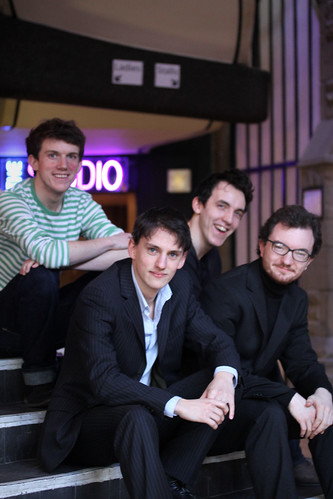
“We were all working on different projects at university,” explains Compton, “and when you discover people that you enjoy working with and the results are positive, you tend to cling onto them. It just ended up that it was the four of us working together on everything.”
Students to the core, all four found difficulties balancing a degree and their performances. All share a time when they nearly dropped out, but it was after they graduated that they decided to fully commit to the company, giving themselves a year to see what happened. September 2010 came and went and in Wilkes’ words, “we got loads of different opportunities that would lead into each other, and that’s brought us to here.”
Belt Up quickly grabbed critics’ attention, winning awards at the National Student Drama Festival in Scarborough (NSDF), the Edinburgh Fringe and the Edinburgh International Festival for various productions, including the Festival Goers award at NSDF for their production of Metamorphosis, voted for by audiences rather than critics. It was at this festival that Belt Up met actress and producer Thelma Holt CBE, now their patron.
“She absolutely loved the show,” remembers Wilkes, “and we thought that if we can impress her, this Fairy Godmother of the theatre world, then… To get support from someone that prestigious was a big boost.”
Now three years old, the foursome’s style has been more carefully defined. Belt Up’s theatre involves audiences getting involved, rather than just sitting back. Why? “Because theatre’s live” says Allen. “Before, you’d get dressed up and have a few drinks, talk about the play afterwards, get an ice cream in the interval… which we don’t do. So we have to create an event in a different way so when the audience turn up they get that sort of excitement, that buzz.”
Wright interjects: “That event culture is spreading in the arts, maybe it’s an economy thing. It’s that idea of getting more for your money, more for your time.”
“You can do anything on stage now and people won’t get out of their seats,” agrees Compton, “whereas for us it’s about getting a reaction from the audience rather than them sitting there and doing nothing.”
The company’s answers are quick, well-learned. There’s a strong cohesion in the group, knowing what their unique style is. Yet for many critics there has been a comparison made to Punchdrunk, a theatre company whose style bears some similarities to Belt Up. Presented with the idea, they quickly reject it. As Wright puts it, “obviously Punchdrunk are f*cking incredible at what they do, but it’s like saying two studio shows are similar just because they’re in studios.”
“I think the fundamental difference is that Punchdrunk don’t require anything from the audience – the audience are free to roam, whereas we’re a bit more traditional because we have a narrative,” says Wilkes.
It is the same critics that Belt Up have a light-hearted view of. On their blog, they feature: “Reviewer of the Week”. It lists some of the negative reviews they received, which Compton describes as “stupid, stupid things they’ve said.”
“We get so many reviewers who give us constructive or brutal criticism but they always make a mistake,” says Allen, describing a review of their ‘special effects’ in a show – that didn’t exist. It turned out another production of Odyssey was done at the National Theatre by a separate group of actors, and that Google was to blame for the mistake.
“Reviewing is such a weird thing to do,” says Wright. “Everybody does [reviewing] so it’s fine…” A pause. “Sorry, I was about to massively name drop Stephen Fry.”
Fry saw Belt Up’s production of The Boy James, written by Wright and performed in London. Last month, after seeing the show, he tweeted: “Just been knocked out by “The Boy James” Belt Up’s interactive show about J. M. Barrie at The Southwark Playhouse. Still drying my eyes.”
Returning to the subject, Wright notes their issue with reviewers: “Our shows ask you to step in and take part. When a reviewer is there, refusing to take part because they’re sat with a notebook, they’re missing the whole point.” In response, the troupe is organising a press-only night for upcoming performances, so that reviewers are forced to get involved.
One show which will attract local critics is The Beggars Opera, a three-night stint in the Theatre Royal in ‘Week Eleven’. It is Belt Up’s first foray into musical theatre, with promises of “fast and furious costume swapping, scene changes and instrument switching,” as well as a “hugely talented choir” backing the performances. Adapted by Wilkes, the posters bear an image of Britain’s only female Prime Minister, her eyes obscured by a sign reading “Down with Thatcher.”
Choosing to do a musical wasn’t a strategic decision, rather, natural progression. “It’s something we’ve always talked about, but also it’s about how you change a musical and do it differently. You have people sing at each other – which is weird because in normal life you don’t have people singing at each other. How do you approach it?”
As we wind up the interview, the Beggars Opera production team start filtering in for the company’s next meeting. Allen waves a sign at them: “You’re a c**t for not seeing Odyssey.” The table erupts with laughter.
As for the future, the four men seem less sure. “Belt Up will always exist in some form,” says Compton, but the group seem keen to further their own interests as well as continuing with the company. Now established names, it seems natural to move forward in their careers. Unable to tell me about their plans for Edinburgh there seems to be only one message coming from Belt Up: watch this space.
Jethro = the whitest guy to ever be associated with Compton.